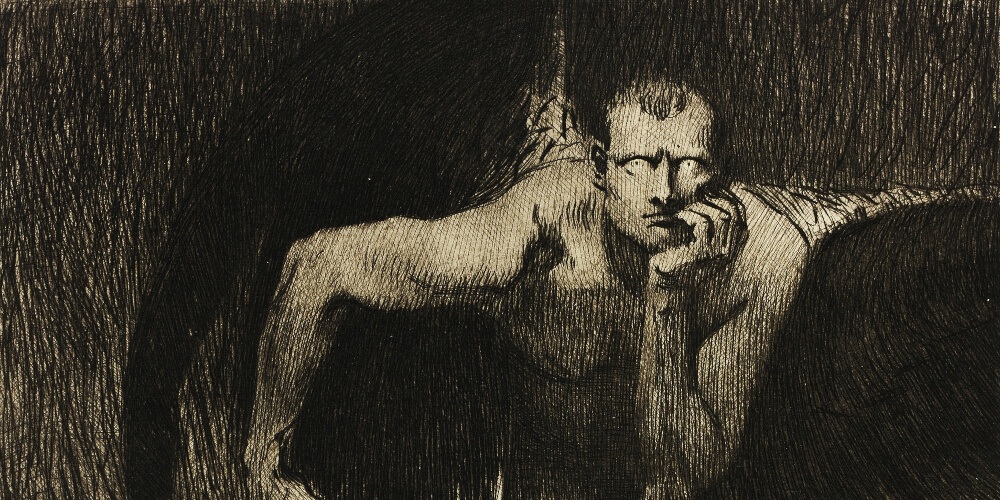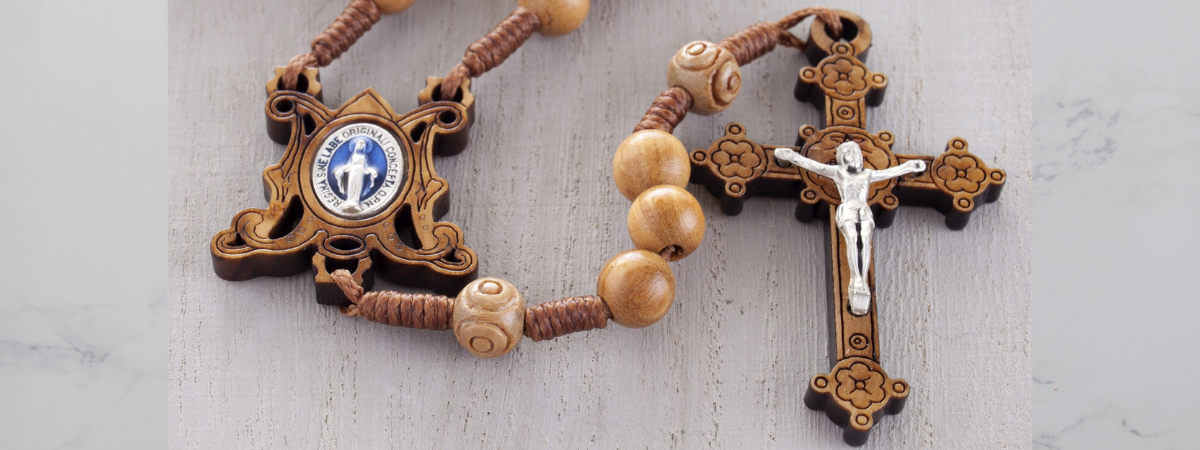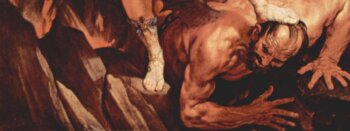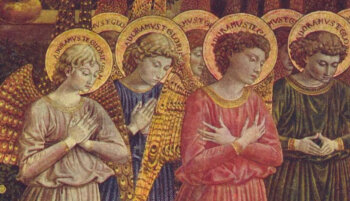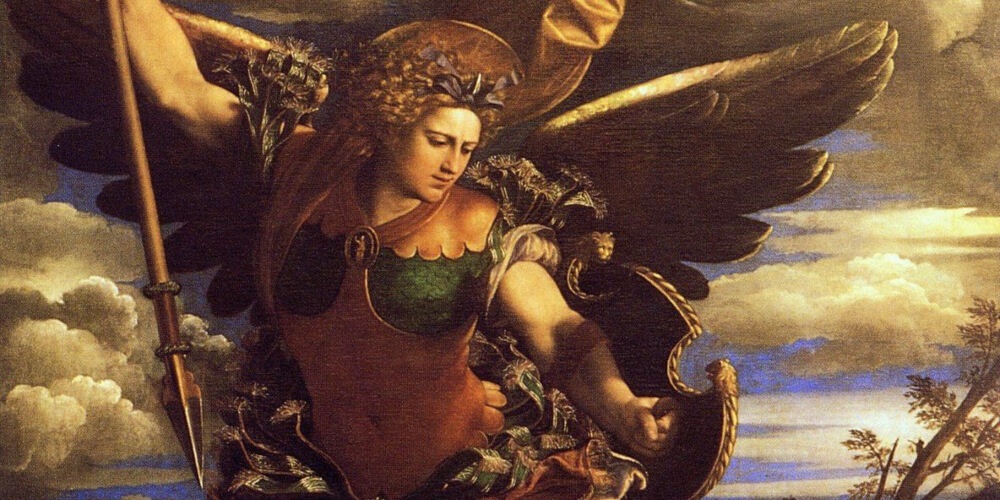
Devotion to St. Michael is ancient and widespread. In the face of the rebellion of the fallen angels and the human race, this archangel stands as the Prince of the Heavenly Hosts, guarding a world whose residents seem determined to dethrone and replace God.
Today—as the demonic assaults on the family, society, and culture are at their peak—his protection is absolutely necessary.
The most important way to seek his aid, of course, is through the St. Michael Prayer, which is recited by Catholics all over the world.
But are you familiar with what the 1888 version of this prayer actually said—which is rather chilling?
Let’s get the facts on the history of this prayer, but first—we should focus on the Archangel himself.
St. Michael: Warrior From the Beginning
St. Michael appears in both the Old and New Testaments. His name in Hebrew is Mikhaʾel, which means “Who is like God?”
He has been the leader of the heavenly hosts ever since the testing of the angels, in which he was indignant at Satan’s defiance and rose up to make his own choice to serve the Lord and to defend His holy name and all that He had made.
…in the midst of the upheaval in the orders of angels, among those who had chosen against God and His will, another shout arose from an angel who was placed in one of the lower ranks, an archangel who cried out with an intensity of love that overcomes all personal pride: God is all perfect. God is all good. Who is equal to Him in wisdom or power? Who is like unto God?
Fr. John Horgan, His Angels At Our Side
These words, the first rhetorical question in the history of creation, were formed in perfect truth, love, and humility. They identify and name the angel who spoke them: Michael, who becomes the leader of the heavenly hosts in the first clash of wills between God’s angels and those who had become his adversaries…
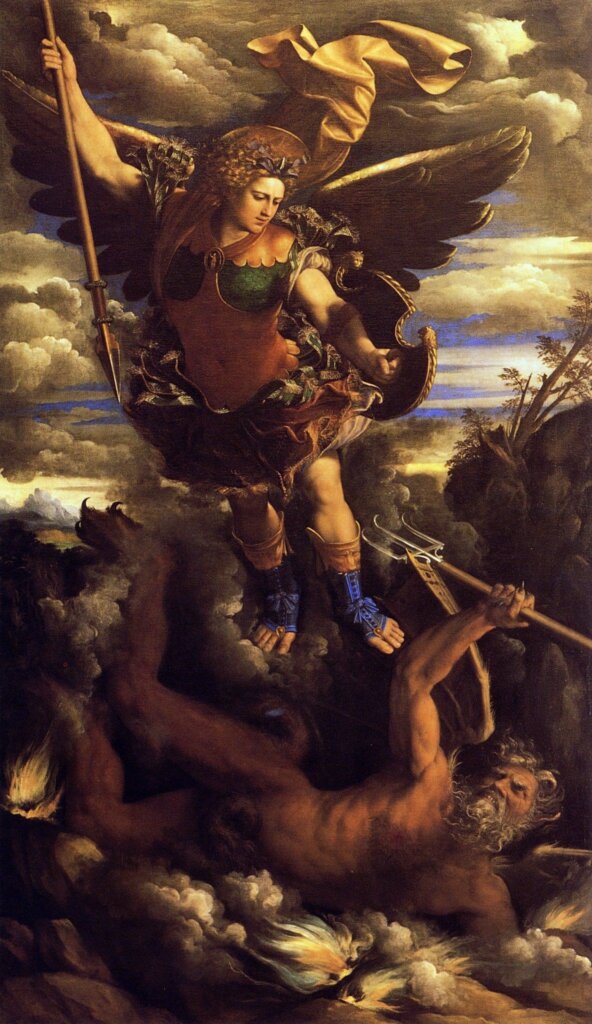
St. Gabriel himself spoke of Michael as “Michael, your prince” and “one of the chief princes” to the prophet Daniel (Daniel 10:13, 21) for Michael had supported Gabriel in his spiritual battle against various pagan kings.
It is believed that St. Michael was the personal guardian of Jesus Christ while He was on earth. The Church has always had a deep devotion to this archangel, who is her faithful defender and the arch-enemy of Satan. Sanctuaries have been built in his honor since the 1st century and many saints had profound devotion to him.
According to Christian tradition, St. Michael performs four offices:
- He fights against Satan
- He rescues the souls of the faithful from the power of the enemy, especially at the hour of death
- He is the champion of God’s people and the patron of the Church
- He attends the dying and brings their souls to the judgment
St. Michael is known to assist exorcists in casting out demons. Adam Blai, demonologist and trainer of exorcists, notes that demons are intimidated by Michael and are “rarely bold enough to trash-talk him or challenge him.” The demons have been forced to admit, during exorcisms, that Michael is the “greatest and largest of the angels” and that they “fear him.”
St. Michael himself intervened in the carefully-documented 1949 exorcism of “Robbie Mannheim” (real name protected). Months of the priests’ exorcisms finally ended on Easter Sunday when, in the midst of the exorcism prayers, a commanding voice identified itself as Michael and ordered Satan to leave NOW “in the name of Dominus (the Lord).” There were violent contortions of the demoniac and “a kind of sonic boom,” according to a priest—and the devil was hurled out of the boy’s body once and for all. Half a dozen priests praying the Divine Office in the nearby college church also heard the boom and saw an incredible light fill the whole church.
These stories should increase our awe for St. Michael, Guardian of the Catholic Church, and spur us to seek his intercession for our families and the universal Church.
I have great reverence for Saint Michael the Archangel; he had no example to follow in doing the will of God, and yet he fulfilled God’s will faithfully.
St. Faustina Kowalska
The Origins of the St. Michael Prayer
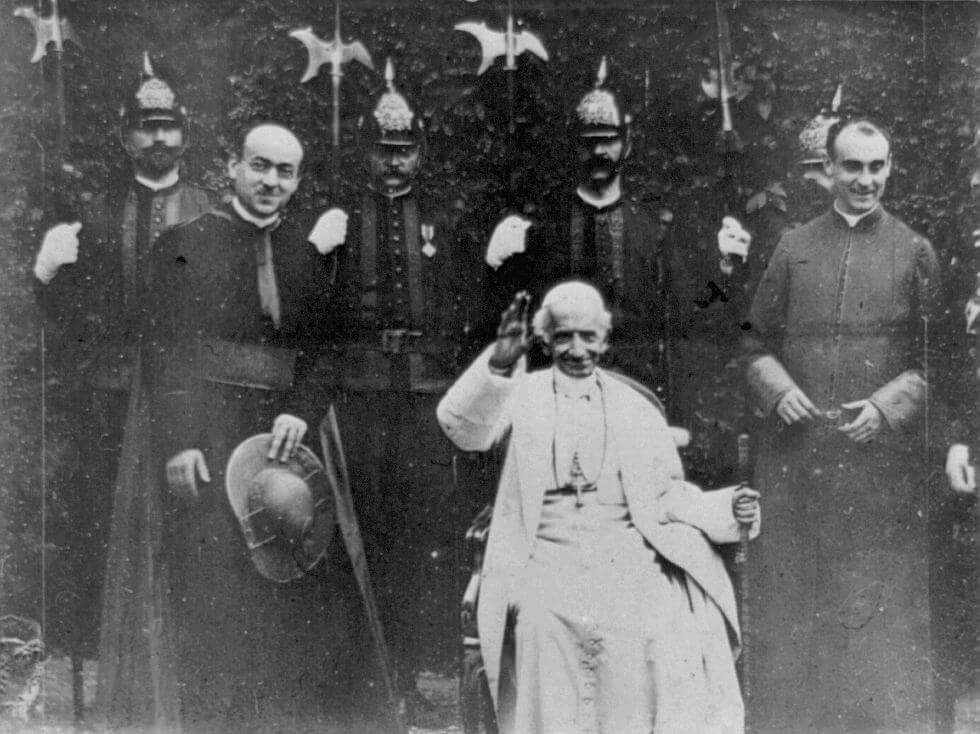
The St. Michael prayer is relatively new in the history of the Church. It was composed by Pope Leo XIII and included in the 1886 “Prayers After Mass” which were added and required to be said after all Low Masses in the Latin Rite.
What inspired this prayer? There are various versions of a story that explain it.
The basic account is that Pope Leo XIII had a terrible vision one day, shortly after saying his morning Mass. Some accounts say he collapsed; others say he was in a trance and was seen gazing in horror. Some accounts say he overheard a conversation between God and the devil; others say he simply saw a horrific vision of the works of Satan that would occur in the 20th century.
The story seems credible, though we do not have absolute evidence. For example, we have the word of a contemporary of Pope Leo XIII “who was a cardinal and knew his personal secretary,” and an unnamed man who had a short audience with the Pope and wrote about it in a German publication in 1891. After making its way to Germany, the account seems to have spread around the world.
Here is the compelling version published in 1891:
A rather peculiar circumstance induced Pope Leo XIII to compose this powerful prayer. After celebrating Mass one day he was in conference with the Cardinals. Suddenly he sank to the floor. Several doctors were summoned at once but found no pulse—the very life seemed to have ebbed away from the fragile and aging body. Suddenly he recovered and said: “What a horrible vision I have been shown!” He saw the ages to come, the seductive powers and ravings of the devils against the Church in every land. But St. Michael appeared in the moment of greatest distress and cast Satan and his cohorts back into the abyss of hell. Such was the occasion that caused Pope Leo XIII to prescribe this prayer for the universal Church.
Account by Monsignor Carl Vogl, as presented in Pope Leo XIII and the Prayer to St. Michael by Kevin Symonds
The 1888 Prayer and 1890 “Exorcismus” Prayer to St. Michael
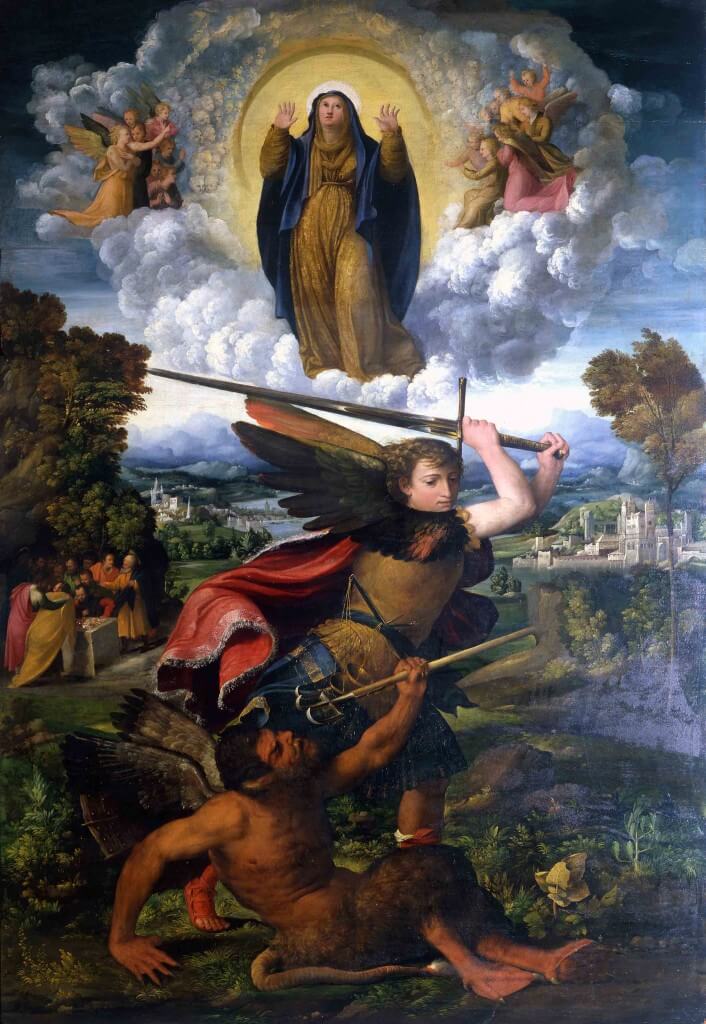
The prayer that we are familiar with comes from the 1886 “Prayers After (Low) Mass” composed by Pope Leo XIII.
As we learn from Kevin Symonds’s book on the history of the St. Michael prayer:
The historical evidence also suggests that [Pope] Leo may have issued—if not composed himself—the 1888 Preactio ad S. Michaelem Archangelum prayer, which, as we discussed, became a part of the 1890 Exorcismus prayer.
[T]he style of the 1890 Exorcismus prayer was different from the usual prayers of exorcism. The difference being that the prayer was not about casting demons out of a person, but rather intended to impede the activities of the Devil and his angels within the Church.
Pope Leo XIII and the Prayer to St. Michael by Kevin Symonds
Here is the text of the 1888 prayer:
Most glorious prince of the heavenly hosts, Archangel St Michael, defend us in the battle and in the tremendous struggle we carry on against the Principalities and Powers, against the rulers of the world of darkness and all evil spirits. Come to the help of man, whom God created immortal, fashioned to His own image and likeness, and rescued at a great price from the tyranny of the devil. With the great army of the holy angels fight today the battle of the Lord as thou didst of old fight against Lucifer, the leader of the proud, and his apostate angels, who were powerless against thee, and they had no longer a place in Heaven; and that monster, the old serpent who is called the devil and Satan, that seduces the whole world, was cast into hell with his angels.
But now that first enemy and homicide has regained his insolent boldness. Taking on the appearance of an angel of light, he has invaded the earth, and with his whole train of evil spirits he is prowling about among men, striving to blot out the name of God and of His Christ, to capture, to destroy, to drag to eternal perdition the souls destined to the crown of eternal glory. That malignant dragon is pouring abroad, like a foul stream, into the souls of men of ruined intellect and corrupt heart the poison of his wickedness, the spirit of lying, of impiety and blasphemy, the pestilent breath of impurity and of all vice and iniquity. Most cunning enemies have filled with bitterness and drenched with gall the Church, the Spouse of the Lamb without spot, and have lifted impious hands against all that is most sacred in it. Even in the holy place where the See of Blessed peter and the chair of truth was set up to enlighten the world, they have raised the abominable throne of their impiety with the iniquitous hope that the Shepherd may be stricken and the flock scattered abroad.
Arise, then, unconquerable Prince, defend the people of God against the assaults of the reprobate spirits, and give them the victory. Holy Church reveres thee as its guardian and patron; it glories in thee as its defender against the malignant powers of hell; to thee God has committed the souls that are to be conveyed to the seats of the Blessed in eternal happiness. Pray, then, to the God of peace, that He may put Satan under our feet, so completely vanquished that he may no longer be able to hold men in bondage and work harm to the Church. Offer up our prayers before the Most High, so that the mercies of the Lord may prevent us, and lay hold of the dragon, the old serpent, who is the devil and Satan, and hurl him bound in chains into the abyss where he may no longer seduce the souls of men. Amen.
V. Behold the Cross of the Lord, fly ye hostile ranks.
R. The Lion of the tribe of Juda, the Root of David, has conquered.
V. May Thy mercies, O Lord, be fulfilled in us.
R. As we have hoped in Thee.
V. Lord, hear my prayer.
R. And let my cry come unto Thee.
Let thy mercies be upon us, O Lord. / As we have hoped in thee.
O Lord, hear my prayer. / And let my cry come unto thee.
Let us pray.
O God, and the Father of Our Lord Jesus Christ, we call upon Thy holy name and humbly beseech Thy clemency, that, through the intercession of the ever-immaculate Virgin and our Mother Mary, and of the glorious Archangel Saint Michael, thou wouldst vouchsafe to help us against Satan and all the other unclean spirits that are prowling about the world to the great peril of the human race and the loss of souls. Amen.
Pope Leo XIII
The St. Michael Prayer Memorized by Catholics
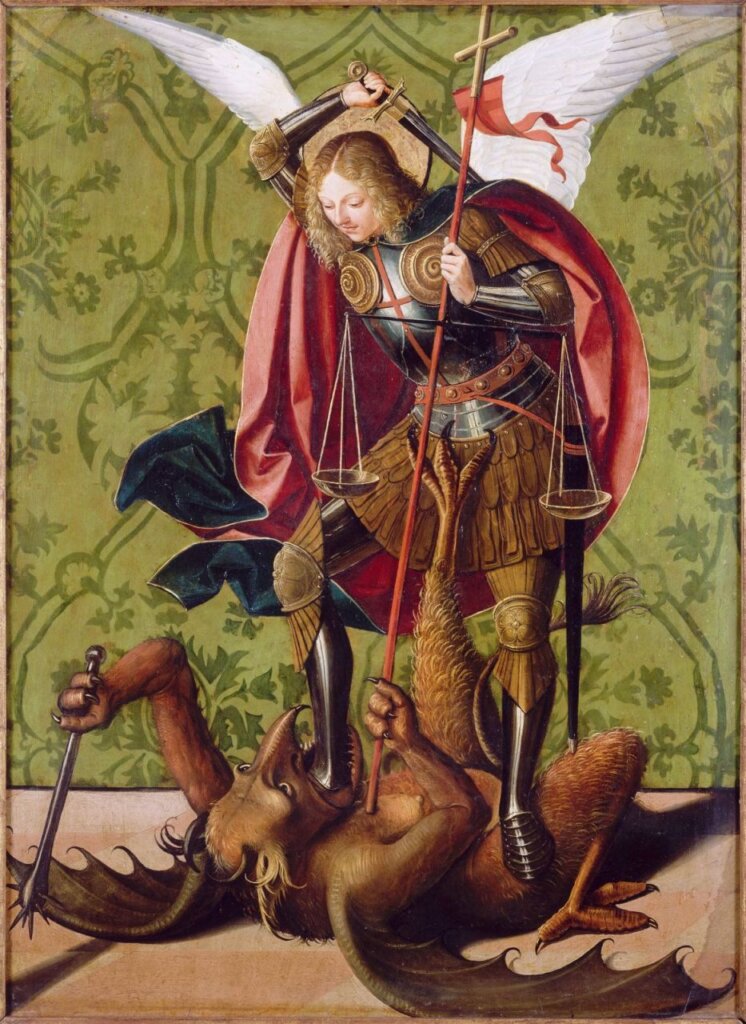
Here is the text of the prayer commonly known today, as taken from Pope Leo XIII’s first composition.
It is easy to memorize and important to do so. Many Catholics recite it after saying the Rosary:
St. Michael the Archangel, defend us in battle;
be our protection against the wickedness and snares of the devil.
May God rebuke him, we humbly pray;
and do thou, O prince of the heavenly host,
by the power of God,
cast into hell Satan and all the evil spirits
who prowl throughout the world seeking the ruin of souls.
Amen.
Starting in 1886, this prayer was said by priest and parishioners after every Low Mass in the Latin Rite. In the aftermath of various changes that came about after the Second Vatican Council, Low Mass was ended, and the St. Michael Prayer was—unfortunately—no longer said starting around 1965.
In 1994, however, Pope John Paul II urged Catholics to recite this prayer frequently. It is likely due to his encouragement that the St. Michael Prayer, although no longer a part of the Mass, began to be recited communally by the laity in many parishes after Mass has ended.
Your own parish may do this today. If not, you could consider asking your parish priest if the congregation could recite this prayer together after Mass.
Hold fast to this spiritual weapon—pray it daily.
This article was excerpted from the fascinating series Spiritual Warfare, featuring video host Chaplain Colonel Matt Pawlikowski (RET). Subscribers have raved about the experience of this spiritual journey. You can join them by signing up here.

